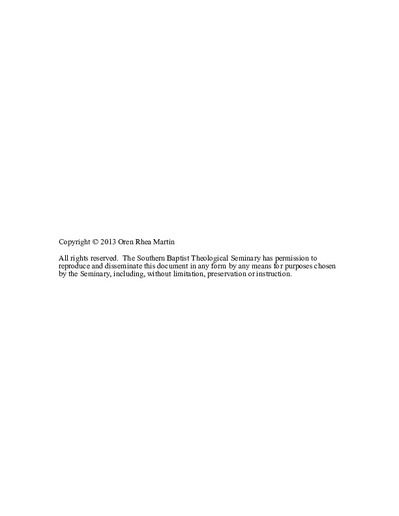| dc.description.abstract | Oren Rhea Martin, Ph.D.
The Southern Baptist Theological Seminary, 2013
Chair: Dr. Bruce A. Ware
Chapter 1 introduces the thesis, states the purpose, and defines the dissertation's specific goals. Attention is then given to a summary of research before a closing section presents the methodology that is used: a historical-exegetical, epochal, and canonical-eschatological approach to biblical interpretation and theological formulation.
Chapter 2 provides the biblical-theological framework from which a theology of land can be canonically understood. More specifically, the framework for understanding the place, or land, of God's people is the kingdom. God's kingdom commences in Eden, and after the fall of mankind into sin God's kingdom will come through his divinely-initiated covenants with his people. In the end, God will once again create a place--a new heaven and a new earth--for his people through the fulfillment of his covenant promises in Christ, who wins the new creation and reigns in his kingdom forever.
Working out of this framework, the next two chapters trace the theme of land as it progressively unfolds across the canon. To begin, Chapter 3 connects the promise of land to Abraham to the preceding events in Genesis 1-11. Then, the promise of land within the Abrahamic covenant is evaluated, which is followed by partial fulfillments through Israel's history under leaders such as Joshua, David, and Solomon. However, each stage of fulfillment is not final, for every fulfillment is followed by covenant failure. Instead, each fulfillment and failure anticipates something greater, which the canonical prophets proclaim.
What begins in the Old Testament is fulfilled in the New. Chapter 4, then, demonstrates the inaugurated fulfillment of the kingdom with the coming of Christ and his work. That is, the blessings of the land come now to those who are united to Christ by faith and they await their future, final fulfillment in the new creation. Thus, the fulfillment of the land in the New Testament is inaugurated but not yet consummated.
Finally, chapter 5 summarizes and concludes the overall argument of this dissertation. The argument is then evaluated in light of the two dominant theological systems today, namely, dispensationalism and covenant theology. | en_US |

